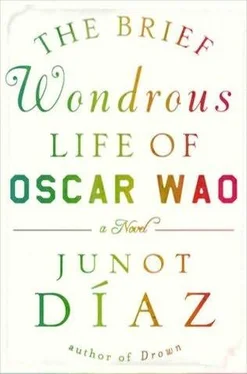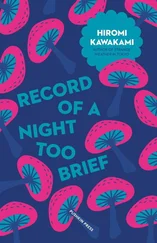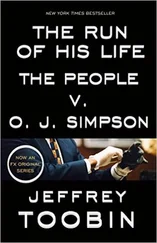My poor Max, who loved me beyond words. Who said I’m so lucky every time we fucked. It was not like we were in the same circles or the same neighborhood. Sometimes when the peledista drove me to the moteles I could swear that I saw Max zipping through the horrendous traffic of the midday, a film reel under his arm (I tried to get him to buy a backpack but he said he liked it his way). My brave Max, who could slip between two bumpers the way a lie can slide between a person’s teeth.
What happened was that one day he miscalculated—heart broken, I’m sure—and ended up being mashed between a bus bound for the Cibao and one bound for Baní. His skull shattering in a million little pieces, the film unspooling across the entire street.
I only heard about it after they buried him. His sister called me.
He loved you best of all, she sobbed. Best of all.
The curse, some of you will say.
Life, is what I say. Life.
You never saw anybody go so quiet. I gave his mother the money I’d taken from the peledista. His little brother Maxim used it to buy a yola to Puerto Rico and last I heard he was doing good for himself there. He owned a little store and his mother no longer lives in Los Très Brazos. My toto good for something after all.
I will love you always, my abuela said at the airport. And then she turned away.
It was only when I got on the plane that I started crying. I know this sounds ridiculous but I don’t think I really stopped until I met you. I know I didn’t stop atoning. The other passengers must have thought I was crazy. I kept expecting my mother to hit me, to call me an idiota, a bruta, a fea, a malcriada, to change seats, but she didn’t.
She put her hand on mine and left it there. When the woman in front turned around and said: Tell that girl of yours to be quiet, she said, Tell that culo of yours to stop stinking.
I felt sorriest for the viejo next to us. You could tell he’d been visiting his family. He had on a little fedora and his best pressed chacabana. It’s OK, muchacha, he said, patting my back. Santo Domingo will always be there. It was there in the beginning and it will be there at the end.
For God’s sake, my mother muttered, and then closed her eyes and went to sleep.
FIVE
Poor Abelard 1944-1946
When the family talks about it at all—which is like never they always begin in the same place: with Abelard and the Bad Thing he said about Trujillo.↓
≡ There are other beginnings certainly, better ones, to be sure—if you ask me I would have started when the Spaniards ‘discovered’ the New World—or when the U.S. invaded Santo Domingo in 1916—but if this was the opening that the de Leóns chose for themselves, then who am I to question their historiography?
Abelard Luis Cabral was Oscar and Lola’s grandfather, a surgeon who had studied in Mexico City in the Lazaro Cardenas years and in the mid-1940’s, before any of us were even born, a man of considerable standing in La Vega. Un hombre muy serio, muy educado y muy bien plantado.
(You can already see where this is headed.) In those long-ago days—before delincuencia and bank failures, before Diaspora—the Cabrals were numbered among the High of the Land. They were not as filthy-rich or as historically significant as the Ral Cabrals of Santiago, but they weren’t too shabby a cadet branch, either. In La Vega, where the family had lived since 1791, they were practically royalty, as much a landmark as La Casa Amarilla and the Rio Camu; neighbors spoke of the fourteen-room house that Abelard’s father had built, Casa Hatüey↓, a rambling oft-expanded villa eclectic whose original stone core had been transformed into Abelard’s study, a house bounded by groves of almonds and dwarf-mangos; there was also the modern Art Deco apartment in Santiago, where Abelard often spent his weekends attending the family businesses; the freshly refurbished stables that could have comfortably billeted a dozen horses; the horses themselves: six Berbers with skin like vellum; and of course the five full-time servants (of the rayano variety).
≡ Hatüey, in case you’ve forgotten, was the Taino Ho Chi Minh. When the Spaniards were committing First Genocide in the Dominican Republic, Hatüey left the Island and canoed to Cuba, looking for reinforcements, his voyage a precursor to the trip Maximo Gomez would take almost three hundred years later. Casa Hatüey was named Hatüey because in Times Past it supposedly had been owned by a descendant of the priest who tried to baptize Harney right before the Spaniards burned him at the stake. (What Hatüey said on that pyre is a legend in itself: Are there white people in Heaven? Then I’d rather go to Hell.) History, however, has not been kind to Harney. Unless something changes ASAP he will go out like his camarada Crazy Horse. Coffled to a beer, in a country not his own.
While the rest of the country in that period subsisted on rocks and scraps of yuca and were host to endless coils of intestinal worms, the Cabrals dined on pastas and sweet Italian sausages, scraped Jalisco silver on flatware from Beleek. A surgeon’s income was a fine thing but Abelard’s portfolio (if such things existed in those days) was the real source of the family wealth: from his hateful, cantankerous father (now dead) Abelard had inherited a pair of prosperous supermercados in Santiago, a cement factory, and titles to a string of fincas in the Septrionales.
The Cabrals were, as you might have guessed, members of the Fortunate People. Summers they ‘borrowed’ a cousin’s cabana in Puerto Plata and decamped there for a period of no less than three weeks. Abelard’s two daughters, Jacquelyn and Astrid, swam and played in the surf (often suffering Mulatto Pigment Degradation Disorder, a.k.a. tans) under the watchful gaze of their mother, who, unable to risk no extra darkness, remained chained to her umbrella’s shadow—while their father, when not listening to the news from the War, roamed the shoreline, his face set in tense concentration. He walked barefoot, stripped down to his white shirt and his vest, his pant legs rolled, his demi-afro an avuncular torch, plump with middle age. Sometimes a fragment of a shell or a dying horseshoe crab would catch Abelard’s attention and he’d get down on all fours and examine it with a gem-cutter’s glass so that to both his delighted daughters, as well as to his appalled wife, he resembled a dog sniffing a turd.
There are still those in the Cibao who remember Abelard, and all will tell you that besides being a brilliant doctor he possessed one of the most remarkable minds in the country: indefatigably curious, alarmingly prodigious, and especially suited for linguistic and computational complexity. The viejo was widely read in Spanish, English, French, Latin, and Greek; a collector of rare books, an advocate of outlandish abstractions, a contributor to the Journal of Tropical Medicine , and an amateur ethnographer in the Fernando Ortiz mode. Abelard was, in short, a Brain—not entirely uncommon in the Mexico where he had studied but an exceedingly rare species on the Island of Supreme General Rafael Leonidas Trujillo Molina. He encouraged his daughters to read and prepared them to follow him into the Profession (they could speak French and read Latin before they were nine), and so keen was he about learning that any new piece of knowledge, no matter how arcane or trivial, could send his ass over the Van Allen belt. His parlor, so tastefully wallpapered by his father’s second wife, was hangout number one for the local todologos. Discussions would rage for entire evenings, and while Abelard was often frustrated by the poor quality—nothing like at the UNAM—he would not have abandoned these evenings for anything. Often his daughters would bid their father good night only to find him the next morning still engaged in some utterly obscure debate with his friends, eyes red, hair akimbo, woozy but game. They would go to him and he would kiss each in turn, calling them his Brillantes. These youthful intelligences, he often boasted to his friends, will best us all.
Читать дальше







![О Генри - Недолгий триумф Тильди [The Brief Debut of Tildy]](/books/415353/o-genri-nedolgij-triumf-tildi-the-brief-debut-of-thumb.webp)




